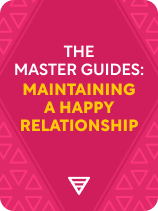

This article is an excerpt from the Shortform book guide to "The Master Guides: Maintaining a Happy Relationship" by Shortform. Shortform has the world's best summaries and analyses of books you should be reading.
Like this article? Sign up for a free trial here.
When you were young, what did you learn about conflict in relationships? Do you tend to fight dirty or just avoid conflict altogether?
Relational conflict is unavoidable. But, destructive conflict is optional. If you’re committed to doing your part to build and maintain a happy relationship, equip yourself to fight in a healthy manner and choose your battles wisely.
Keep reading for expert advice on how to argue with your partner in a way that ultimately brings you closer together.
How to Argue With Your Partner
We’ve gathered advice from several relationship experts on how to argue with your partner: reduce flooding, fight like a secure attacher, and talk about how you manage conflict. Let’s take a good look at each tip.
Tip #1: Reduce Flooding
In The Seven Principles for Making Marriage Work, relationship researcher John Gottman and coauthor Nan Silver explain that conflicts can destroy relationships if they induce regular flooding—a psychological phenomenon in which one partner feels so emotionally stressed that they’re unable to respond rationally to their spouse. The authors name four damaging patterns of behavior—the “four horsemen of the apocalypse”—that you should watch out for because they may heighten the risk of flooding, which leads spouses to emotionally detach from one another. These are criticism, contempt, defensiveness, and stonewalling.
Gottman and Silver warn against the four horsemen because they heighten the risk of flooding. However, there are things you can do during your argument to stop yourself and your partner from engaging in the four horsemen—and to mitigate their impact if one of you does.
First, the authors suggest that you adjust the beginning. If you begin the conversation negatively, you’re more likely to induce a negative response (such as criticism, contempt, defensiveness, or stonewalling) from your partner—which increases the likelihood of flooding. Instead, begin the conversation calmly. First, describe your emotions about the issue. Avoid making accusatory statements that begin with “you,” generalizing the issue, or passing immediate judgment. Second, express your desires (not what you don’t desire) to your partner.
For example, if you’re upset because your partner is on their phone during dinner, don’t say, “I can’t believe you’re on your phone! You never make time for me.” Instead, say, “I’m really upset that you’re on your phone during dinner. I’d like to spend time with you when we’re both focused solely on each other.”
Second, calm down. Gottman and Silver note that if you’re feeling flooded—which you may feel if you or your partner engages in one of the four horsemen—you likely won’t be able to have a productive discussion. So pay attention to your emotional and physical state: If you feel as though you’re about to blow up on your partner or your heart rate rises dramatically, you’re likely flooded. If so, take a 20-minute break to calm yourself. Do something that prevents you from ruminating on your argument; Gottman and Silver suggest physical exercise or meditation.
Once you’ve calmed yourself, try calming your partner. Gottman and Silver explain that if you regularly calm your partner, your partner will connect your presence with a reduction in stress rather than an increase in stress, which will naturally improve your relationship. This does not mean telling your partner to “calm down” mid-argument; this will only anger them further because they’ll feel as though you’re not taking them seriously. Instead, pick a time when you’re not fighting to brainstorm ways to relax each other. Then, after your 20-minute break, do the thing you’ve discussed; giving each other massages is a popular relaxation technique.
Tip #2: Fight Like a Secure Attacher
In Attached, psychiatrist Amir Levine and psychologist Rachel Heller suggest another strategy for fighting more effectively in relationships: Learn to fight like a secure attacher, who generally has a healthy and comfortable relationship with intimacy.
Levine and Heller explain that learning to fight like a secure attacher helps all couples because it teaches you how to clearly and effectively communicate your needs. However, it’s especially helpful for anxious-avoidant pairs. This is because even if you’re an insecure attacher, you can gradually develop a more secure attachment style by repeatedly behaving like a secure person—and the more secure your attachment style, the less likely you are to fall into the damaging anxious-avoidant pattern we described earlier.
So, how can you behave like a secure person during a fight? Levine and Heller name four strategies you can adopt to handle conflicts in a way that will bring you closer.
1. Show genuine concern for the other person’s feelings. Remember that a disagreement between partners isn’t a zero-sum game where one person wins and the other loses. Your happiness and your partner’s happiness are tied up together, so when both partners feel validated, both partners win.
2. Keep the argument centered on the present issue. Don’t get sidetracked or expand the argument to include other issues. Avoid a full-blown venting session, and just address one conflict at a time.
3. Be willing to take part in the discussion. Don’t disengage or withdraw. Both partners need to be willing to address the issue head-on so that it can be resolved in a mutually satisfactory way, even if it means some arguing along the way.
4. Openly communicate your needs and feelings. No matter how long you’ve been with your partner, you can’t expect them to be a mind reader. Tell them what you need and want clearly and directly.
Tip #3: Talk About How You Manage Conflict
Improving your ability to manage conflicts doesn’t just involve changing how you behave during the fight. In Eight Dates, John Gottman, his wife—fellow relationship researcher Julie Schwartz Gottman—and married couple Doug Abrams and Rachel Carlton Abrams recommend that you have a date night dedicated to understanding how your partner manages disagreements and how you can manage disagreements more effectively as a couple. They explain that to resolve disagreements effectively, you must approach each one as an opportunity to increase your understanding of the other person—not as an opportunity to win.
Use the following questions to help guide your conversation:
- What did you learn about conflict or managing conflict growing up? How have you navigated conflict in the past?
- What are your beliefs about anger? What do you need when you’re feeling angry?
- How would you like to manage conflict differently in the future?

———End of Preview———
Like what you just read? Read the rest of the world's best book summary and analysis of Shortform's "The Master Guides: Maintaining a Happy Relationship" at Shortform.
Here's what you'll find in our full The Master Guides: Maintaining a Happy Relationship summary:
- Advice from top relationship experts on how to maintain a happy relationship
- How to sustain both emotional and physical intimacy
- How to handle conflict so it doesn't ruin your relationship






